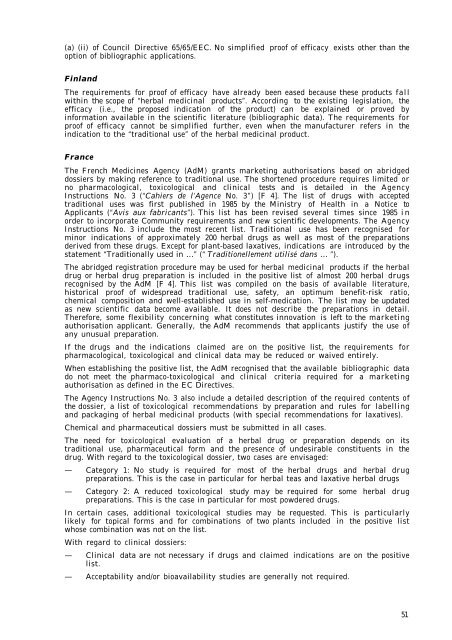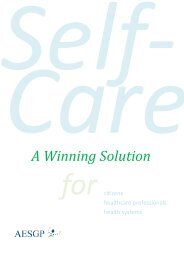Herbal medicinal products in the European Union - AESGP
Herbal medicinal products in the European Union - AESGP
Herbal medicinal products in the European Union - AESGP
Create successful ePaper yourself
Turn your PDF publications into a flip-book with our unique Google optimized e-Paper software.
(a) (ii) of Council Directive 65/65/EEC. No simplified proof of efficacy exists o<strong>the</strong>r than <strong>the</strong><br />
option of bibliographic applications.<br />
F<strong>in</strong>land<br />
The requirements for proof of efficacy have already been eased because <strong>the</strong>se <strong>products</strong> fall<br />
with<strong>in</strong> <strong>the</strong> scope of “herbal <strong>medic<strong>in</strong>al</strong> <strong>products</strong>”. Accord<strong>in</strong>g to <strong>the</strong> exist<strong>in</strong>g legislation, <strong>the</strong><br />
efficacy (i.e., <strong>the</strong> proposed <strong>in</strong>dication of <strong>the</strong> product) can be expla<strong>in</strong>ed or proved by<br />
<strong>in</strong>formation available <strong>in</strong> <strong>the</strong> scientific literature (bibliographic data). The requirements for<br />
proof of efficacy cannot be simplified fur<strong>the</strong>r, even when <strong>the</strong> manufacturer refers <strong>in</strong> <strong>the</strong><br />
<strong>in</strong>dication to <strong>the</strong> “traditional use” of <strong>the</strong> herbal <strong>medic<strong>in</strong>al</strong> product.<br />
France<br />
The French Medic<strong>in</strong>es Agency (AdM) grants market<strong>in</strong>g authorisations based on abridged<br />
dossiers by mak<strong>in</strong>g reference to traditional use. The shortened procedure requires limited or<br />
no pharmacological, toxicological and cl<strong>in</strong>ical tests and is detailed <strong>in</strong> <strong>the</strong> Agency<br />
Instructions No. 3 (“Cahiers de l’Agence No. 3”) [F 4]. The list of drugs with accepted<br />
traditional uses was first published <strong>in</strong> 1985 by <strong>the</strong> M<strong>in</strong>istry of Health <strong>in</strong> a Notice to<br />
Applicants (“Avis aux fabricants”). This list has been revised several times s<strong>in</strong>ce 1985 i n<br />
order to <strong>in</strong>corporate Community requirements and new scientific developments. The Agency<br />
Instructions No. 3 <strong>in</strong>clude <strong>the</strong> most recent list. Traditional use has been recognised for<br />
m<strong>in</strong>or <strong>in</strong>dications of approximately 200 herbal drugs as well as most of <strong>the</strong> preparations<br />
derived from <strong>the</strong>se drugs. Except for plant-based laxatives, <strong>in</strong>dications are <strong>in</strong>troduced by <strong>the</strong><br />
statement “Traditionally used <strong>in</strong> …” (“ Traditionellement utilisé dans … ”).<br />
The abridged registration procedure may be used for herbal <strong>medic<strong>in</strong>al</strong> <strong>products</strong> if <strong>the</strong> herbal<br />
drug or herbal drug preparation is <strong>in</strong>cluded <strong>in</strong> <strong>the</strong> positive list of almost 200 herbal drugs<br />
recognised by <strong>the</strong> AdM [F 4]. This list was compiled on <strong>the</strong> basis of available literature,<br />
historical proof of widespread traditional use, safety, an optimum benefit-risk ratio,<br />
chemical composition and well-established use <strong>in</strong> self-medication. The list may be updated<br />
as new scientific data become available. It does not describe <strong>the</strong> preparations <strong>in</strong> detail.<br />
Therefore, some flexibility concern<strong>in</strong>g what constitutes <strong>in</strong>novation is left to <strong>the</strong> market<strong>in</strong>g<br />
authorisation applicant. Generally, <strong>the</strong> AdM recommends that applicants justify <strong>the</strong> use of<br />
any unusual preparation.<br />
If <strong>the</strong> drugs and <strong>the</strong> <strong>in</strong>dications claimed are on <strong>the</strong> positive list, <strong>the</strong> requirements for<br />
pharmacological, toxicological and cl<strong>in</strong>ical data may be reduced or waived entirely.<br />
When establish<strong>in</strong>g <strong>the</strong> positive list, <strong>the</strong> AdM recognised that <strong>the</strong> available bibliographic data<br />
do not meet <strong>the</strong> pharmaco-toxicological and cl<strong>in</strong>ical criteria required for a market<strong>in</strong>g<br />
authorisation as def<strong>in</strong>ed <strong>in</strong> <strong>the</strong> EC Directives.<br />
The Agency Instructions No. 3 also <strong>in</strong>clude a detailed description of <strong>the</strong> required contents of<br />
<strong>the</strong> dossier, a list of toxicological recommendations by preparation and rules for labell<strong>in</strong>g<br />
and packag<strong>in</strong>g of herbal <strong>medic<strong>in</strong>al</strong> <strong>products</strong> (with special recommendations for laxatives).<br />
Chemical and pharmaceutical dossiers must be submitted <strong>in</strong> all cases.<br />
The need for toxicological evaluation of a herbal drug or preparation depends on its<br />
traditional use, pharmaceutical form and <strong>the</strong> presence of undesirable constituents <strong>in</strong> <strong>the</strong><br />
drug. With regard to <strong>the</strong> toxicological dossier, two cases are envisaged:<br />
— Category 1: No study is required for most of <strong>the</strong> herbal drugs and herbal drug<br />
preparations. This is <strong>the</strong> case <strong>in</strong> particular for herbal teas and laxative herbal drugs<br />
— Category 2: A reduced toxicological study may be required for some herbal drug<br />
preparations. This is <strong>the</strong> case <strong>in</strong> particular for most powdered drugs.<br />
In certa<strong>in</strong> cases, additional toxicological studies may be requested. This is particularly<br />
likely for topical forms and for comb<strong>in</strong>ations of two plants <strong>in</strong>cluded <strong>in</strong> <strong>the</strong> positive list<br />
whose comb<strong>in</strong>ation was not on <strong>the</strong> list.<br />
With regard to cl<strong>in</strong>ical dossiers:<br />
— Cl<strong>in</strong>ical data are not necessary if drugs and claimed <strong>in</strong>dications are on <strong>the</strong> positive<br />
list.<br />
— Acceptability and/or bioavailability studies are generally not required.<br />
51




